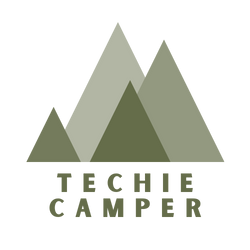We’ve all imagined what it would be like if we were living in a world without technology and had to rely only on ourselves and nature.
Camping brings just that experience to life but safely and securely, where if you can’t figure out how to build a fire, there are many guides to read online and people who can help you!
Camping is enjoyable because it is an adventure. Not only do you get to interact with the environment and wildlife, but you also get to escape the stress and rush of city life.
You’re building memories that will last a lifetime as you pitch tents, start the campfire, and learn about the world around you.
Before we dive into how to make a fire and then boil water while camping, whether it’s to make some tea, boil an egg or take a quick shower, let’s take a look into what camping is, the many benefits that come with it and essentials you must pack!
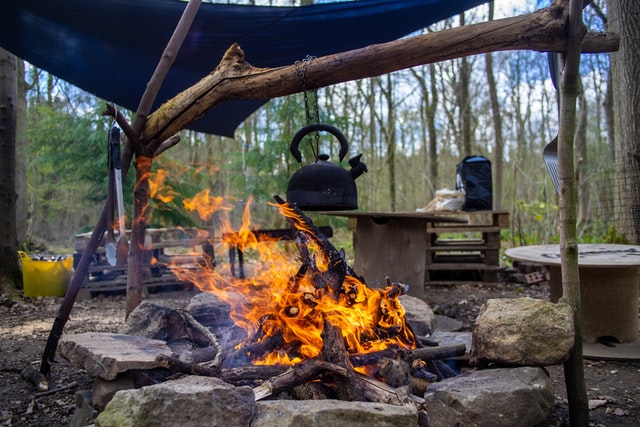
How To Boil Water
Once you’re packed and triple-checked for all of your essentials, this task will no longer seem daunting or impossible.
Here are some of the ways you can boil water while camping:
Over Campfire
Boiling water over a fire may be as simple or as complex as you want it to be. The most basic method is to start a fire and lay a pot or kettle right on the coals.
However, doing so would most certainly make your pot or kettle black with coal dust. Thus it is not recommended.
You might also put your pot up on a huge rock amid the coals. This permits the pot to absorb all of the heat from the fire without coming into close contact with the coals.
A Solar Heater
Using a solar heater is easy; you need to fill the bag with water and put it out in the sun. After a few hours, the exact time frame depends on how much sun there is; your water should be well heated and ready to use.
It’s as simple as that! Even if you’re camping in a really warm and sunny location, it’s worth remembering that you’ll struggle to get truly hot water with a solar shower.
As a result, solar heaters are best suited for heating water for bathing or cleaning the dishes rather than drinking.
A Water Heater
A portable water heater is likely what you need to heat water quickly and reliably for doing the dishes or showering.
Portable water heaters may be very useful equipment while camping. Most can run on gas or electricity, making them useful for vehicle camping even when hookups aren’t available.
To use one of these portable water warmers, switch it on, choose the desired temperature, and turn on the faucet.
When utilities are limited, Water Heaters provide alternatives for both hand and dishwashing and showering.
A Liquid Stove
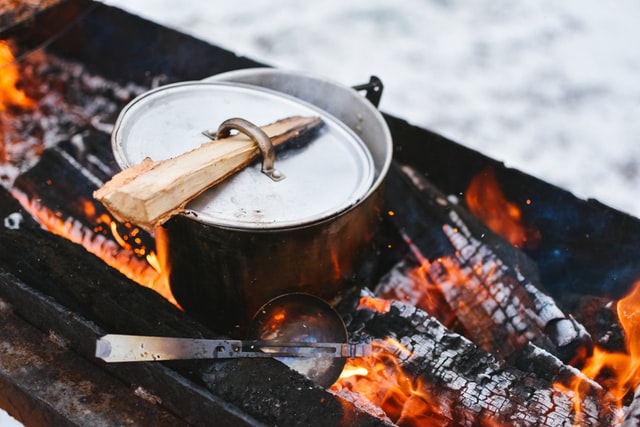
Liquid stoves are a low-emission, high-efficiency choice for boiling water on the path. Although there are other types of liquid fuels available, white gas is the most likely to be found at an outdoor store.
White gas is very useful for camping since it burns cleanly and effectively in almost any environment. While liquid fuel stoves are heavier, they are the greatest option for winter use.
This is because liquid fuel stoves have pumps that allow you to control your fuel pressure. As a result, they’re an excellent choice for regular trips in difficult regions.
What Is Camping?
Camping is an outdoor activity that involves spending the night away from home in a shelter, such as a tent or a recreational vehicle.
Participants typically leave developed regions to spend time outside in more natural places, searching for activities that provide them with enjoyment or an educational experience.
Some people like to disconnect from technology and reconnect with nature. Some families go camping to revitalize their relationships, away from all the distractions at home.
Many youth organizations teach kids how to make a fire, pitch a tent, and read a compass. Different people have different ideas about what camping entails.
What Are The Benefits of Camping?
Camping is a terrific way to get outside and spend quality time with friends, family, or on your own, whether you’re a die-hard camping enthusiast, searching for a low-cost getaway, or revisiting childhood memories.
Exploring the great outdoors and reconnecting with nature also has some significant health benefits:
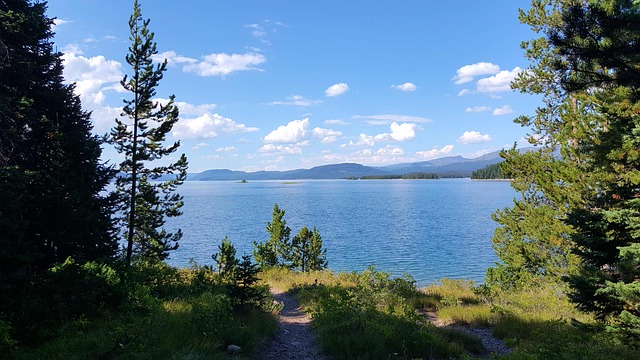
Peace
Unplug from technology, stress, work, studies, etc. and enjoy nature’s simplicity. Instead of charging your cell phones, tablets, and game consoles, recharge your batteries.
Your body and mind will appreciate you, and you will return to work energized and rejuvenated. Switch off the internet, emails, and even the news.
All you need is one charged phone that is kept switched off and stored away for emergencies.
Stress reduction
One of the most significant health advantages of camping is that it decreases stress by replacing usual stressors such as job pressure, traffic, and the hustle and bustle of city life with the relaxing impact of a bird singing, the sound of waves breaking on the beach, and the wind in the trees.
The genuine thing is far more healing than anything on your MP3. When you’re camping, there’s no place to go at a given time, and nothing is interrupting you or vying for your attention.
The natural result of this sort of atmosphere is stress reduction, and relaxation like you’ve never experienced before.
Getting some fresh air
You may be unaware of how limited fresh air is in your daily life. When you go camping, you get to experience the wonderful fragrances of the outdoors as well as the aroma of dinner cooking over an open fire.
Increased Physical Activity
Camping time is physical time. You pitch your tent, get firewood, and head for a trek. We typically lead sedentary lives at home that do not encourage physical fitness.
Camping necessitates additional physical activity to acquire, cook, and store food, navigate a campground and successfully manage your shelter.
Add fishing, swimming, walking, or biking to the mix to boost cardiovascular benefits and calorie burn even more. You can’t help but participate in physical activity and raise your heart rate when you’re camping.
Build Relationships
Do you ever feel that you never talk to your family and that, when you glance around, everyone is on some device?
Being near loved ones or excellent friends without the distraction of modern technology such as cellphones and tablets allows you to interact more directly and make and receive eye contact.
Having to rely on one other to make meals and look after your campground fosters camaraderie, a feeling of community, and a sense of shared purpose, all of which contribute to your overall well-being.
One of the nicest and most significant camping features is how it helps you create and deepen connections.
When you go camping with friends or family, you have the opportunity to converse and visit without interruption, even late at night.
Camping is helpful for children and their families since it may help develop family relationships – brothers and sisters, parents and children, and so on.
You will all feel stronger as a group when you return home.
No Alarm Clocks
When was the last time you slept late without being woken up by an alarm clock? When you’re camping, the light and the sounds of birds are your only alarm clocks.
Everyone should wake up with nature rather than an alarm clock on a regular basis. You will find your body’s biological set itself; you don’t need to rely on the annoying ringing of an alarm anymore.
Improved sleep
From the last point comes the improvement of your sleep cycle. Melatonin is a naturally occurring hormone that regulates your sleep and waking cycles.
When you’re locked in an office for lengthy periods, working in artificial light and blue light from artificial sources like incandescent lights might decrease your melatonin levels.
Camping outside exposes you to melatonin-friendly yellow light, which can assist you in achieving a more natural alignment of the sleep-wake cycle with dawn and sunset.
Great food
Food tastes better when made outside. There’s something about cooking food over a campfire, a campsite grill, or in a Deluxe Cabin kitchen that can’t be replicated at home.
Furthermore, nothing beats s’mores cooked over an open fire. Before your next camping trip, think big and create a fantastic dinner.
Connection with nature
Camping allows you to reconnect with nature, experience wildlife, and gaze at the sky away from the harsh lights of the city. It’s unlike anything else.
When exploring the various benefits of camping, make sure you and your family have the opportunity to interact with nature.
Great food
Food tastes better when made outside. There’s something about cooking food over a campfire, a campsite grill, or in a Deluxe Cabin kitchen that can’t be replicated at home.
Furthermore, nothing beats s’mores cooked over an open fire. Before your next camping trip, think big and create a fantastic dinner.
Memory enhancement
When you go camping and are surrounded by trees and fresh air, your body produces more serotonin, a naturally occurring neurotransmitter.
It helps regulate your mood, appetite, and sleep. Serotonin also helps with cognitive functions, including memory and learning.
Acquiring new abilities
While camping, you can’t help but learn new talents. Everyone on the trip will participate, and it will be a terrific opportunity to learn new things.
You could learn how to pitch a tent, tie knots, build a fire, prepare a fresh meal, and other skills. These are valuable talents to have, but we don’t frequently get the opportunity to hone them amid our hectic lives.
Time spent camping is time spent learning for children, which is one of the reasons scouting programs are so beneficial.
They offer camping experiences centered on children learning new skills such as fishing, cooking, trekking, knot tying, fire-starting, safety, first aid, and much more.
Increased vitamin D levels
When you’re outside, your body absorbs a lot of sunshine. The sun gives the skin a healthy outdoor shine, and the body uses it internally to synthesize Vitamin D.
This aids in absorbing calcium and phosphorus, two nutrients necessary for strong bones and teeth.
Confidence development
Youngsters must become more autonomous and confident in their talents progressively.
One of the advantages of camping for children is that it teaches them independence in a secure and regulated atmosphere.
As children learn new things and have first-time experiences, they gain confidence.
Camping Essentials
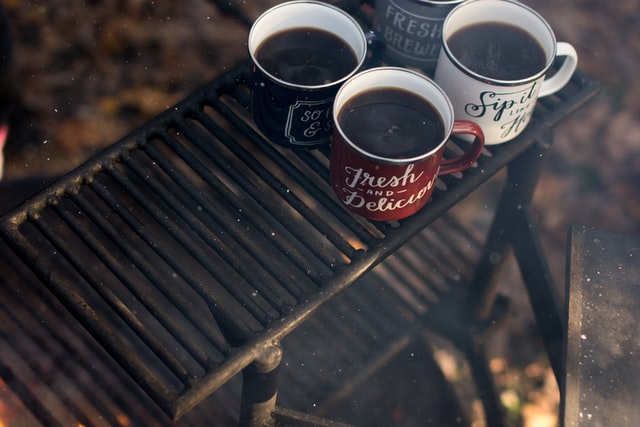
As fun as spontaneous plans can be, going camping requires a certain level of planning so that you can not only have an easy trip but get to enjoy it and make the most of the experience.
Shelter
Unless your shelter is your vehicle, double-check that you brought your tent. If you don’t already have a tent, you have several options.
You may, for example, choose a survival tent, a cold-weather tent, or even a canvas tent unless you like sleeping beneath the stars without a tent.
If you’re only going camping for one night, you might be able to get away with borrowing one. However, if you want to make this a regular habit, you’ll need to invest in a high-quality tent.
If the weather is great, you could even relax on a hammock. Place your sleeping bag in the hammock and sleep off the ground under the sky.
Sleeping Bags
While lying down on a bed of moss and leaves may sound appealing, it will not keep you warm when the sun goes down. Temperatures can drop dramatically at night, perhaps by 20 degrees or more.
Keep in mind that many insects are most active at night and may come into contact with your unwrapped body. Without a sleeping bag, you risk an unpleasant night’s sleep at best and possible exposure at worst.
And if you’ve ever attempted to go camping with your kids, you know they’ll toss and turn all night if they don’t have a kid’s sleeping bag.
Camping Chairs
It’s unpleasant to sit on the ground. It’s okay to ditch them when hiking since chairs are too heavy and big for backpacking but not for camping.
If you’re going camping, you’re most likely going to need a car to get there. So make room in your trunk for a decent camping chair or two.
You’ll be grateful you did when you can escape the back pain with one of these comfy seats.
Emergency Kit
While camping is unlikely to result in a life-threatening injury, a long day of trekking might result in blisters that require bandaging.
Small wounds and scrapes can also develop infected fast if left untreated, so have bandages and antiseptic on hand.
Other items in your first aid box should contain scissors, glue, gauze, soap, a CPR mouth barrier, and an emergency whistle.
Make sure to have sunscreen and bug repellent as well. Sunburn and insect bites may put an end to your trip just as fast as a laceration.
Water
Have you considered your camping water strategy? Is there a public water pump at your campsite? Is it a secluded location by a lake or creek? What if there isn’t any drinkable water around your campground?
Before you travel, you should check the water situation. A site with drinkable water will require different planning than a distant location in the desert.
In any case, you’ll want to make sure you bring a water container for camping and keep it at your campsite for daily usage. You’ll need it for things like cooking, cleaning, and putting out your campfire.
It is suggested that you purchase a few water bricks for this reason. The last thing any camper wants is to be without clean water, especially because drinking from a pond or lake can bring significant disease owing to germs.
Even if you’re only a few feet from the woods, bring a day’s supply of the wet stuff in a Camelbak or other big container.
Then, in case you need to refill from a nearby stream, bring a filter or water purification pills on hand.
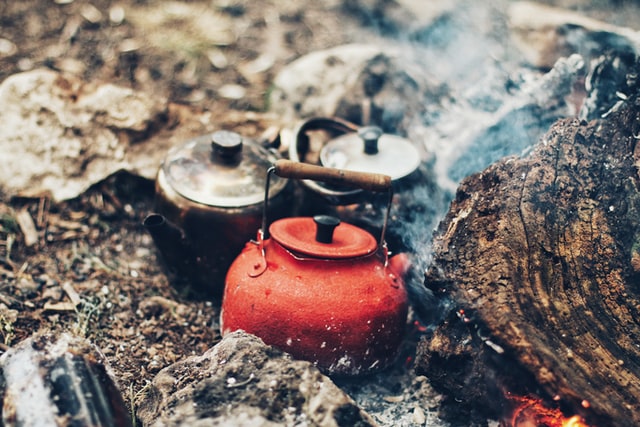
Fire
Camping isn’t complete without a nice, crackling campfire, so have the gear on hand to get one going quickly.
You can start fires with a flint and steel, matches, a cigarette lighter, or a magnesium fire starter. If you decide to use matches, ensure they are waterproof.
It’s a good idea to have two fire starters on hand if one fails. Bring some kindling, such as dried bark or strips of newspaper, in a waterproof container.
Finding dry kindling when you need it might be difficult in the wilderness.
Light
A campfire is lovely and brilliant, but it barely extends approximately six feet in any direction.
A portable, battery-powered light is helpful if you need to locate an item within your tent or visit the toilet late at night.
Because of its hands-free capabilities, many campers recommend headlamps as the ideal alternative.
A Handy Knife
You may need to cut a rope, filet a fish, or carve a walking stick when camping, and a high-quality survival knife is great for these chores.
Invest in a survival knife that you can use to puncture, slice, and cut. Carrying a reliable survival knife when venturing into the outdoors will make camping much more enjoyable and simpler.
The pocket knife is the perfect versatile outdoor tool. Such activities are practically hard to complete without a knife. Expect to get frustrated if you leave your knife at home–often.
Waterproof Clothing
Heavy garments are warm, but they might be unpleasant on a wet camping trip. Bring lightweight, rainproof, waterproof, and breathable clothing as a top layer.
In this manner, you will avoid overheating in hot, humid weather while keeping the rain off in wet weather. waterproof hiking jacket
It’s all about dressing correctly to prepare for various weather situations. Look for extras like armpit zips, mesh pockets, and drawstring hoods to keep you warm and dry.
You won’t be able to enjoy your camping vacation unless you remain both dry and comfy.
Guidance
Bring a map, compass, or GPS if your camping agenda includes hiking in isolated places. The constant movement of the sun can cause woodland features to appear strange, making hikers feel disoriented.
Unprepared campers have occasionally spent days wandering the woods before being rescued or returning to camp.
Getting lost or stranded in the woods is no funny matter, especially with a restricted water supply. Even if your children merely want to go down to a local creek from your campsite, be sure they have a safe way back.Toilet Paper
You might think this one is obvious, but it will often slip people’s minds. Although some survivalists consider toilet paper an unneeded luxury in the outdoors, many campers swear by its necessity.
In terms of comfort and hygiene, bark and leaves are poor alternatives for toilet duties, and a raw bottom can make sitting difficult.
In addition, campgrounds with restrooms have been known to run out of paper on occasion. If you’re going camping in the woods and are concerned about the environmental effect of using toilet paper, get some that are biodegradable or bring a trash bag with you.
The Bottom Line
While camping, there are several ways to heat water without using fire. Every way of boiling water has advantages and downsides. Therefore it’s difficult to tell which the ideal alternative is.
Water boiling times vary depending on your campsite’s altitude, your boiling method, and the type of heat source you’re using, so there’s no set amount of time you should boil water.
However, using a camping stove, particularly a canister burner, to heat water is the most efficient option. Regardless of the weather outside, doing so will give you boiling water in a matter of minutes.
